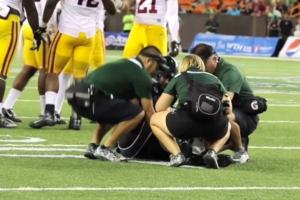Long-term impacts of concussion will be focus of Jan. 28-29 conference
University of Hawaiʻi at MānoaDirector of Communications, Office of Dean of Medicine
Mia Noguchi, (808) 551-1649
Lotus Pond Communications
The University of Hawai’i medical school's Pathology Residency Program joins with the Gary O. Galiher Foundation and the Hawai‘i Concussion Awareness Management Program (HCAMP) this week to host a two-day conference on a topic of growing concern: the long-term impacts of concussion and repetitive head trauma.
Evidence is mounting that repeated blows to the head may cause traumatic brain injury, leading to permanent impairment including memory loss, decline in motor function and even early death. The danger has changed the way team sports and played and coached. Additional training that emphasizes injury prevention has been implemented at all levels, from community or school-based football, basketball, baseball and soccer programs through college and professional sports. (One includes the Centers for Disease Control's Head's Up program at www.cdc.gov/headsup. Prevention has also prompted rule changes in football.
This year’s conference convenes as the public spotlight already is intensely focused on brain damage in former players in the National Football League. A major motion picture, “Concussion” (from the book of the same name) is showing in theaters nationwide. The NFL Pro Bowl is being played here in Hawai’i two days after the conference.
The CTE (Chronic traumatic encephalopathy) Conference is being held on Thursday and Friday, January 28 and 29, at The Queen’s Conference Center in Honolulu. On January 28, the conference runs from 7 a.m. to 4 p.m. On January 29, sessions begin at 8:30 a.m. and continue until 2:45 p.m.
Public Neuro-Huddle on January 29
The second day of the conference features a Neuro-Huddle, open to the public and focused on bringing together coaches, athletic trainers, and parents as well as medical experts to discuss brain injuries and prevention strategies.
Keynote speakers
Dr. Robert Stern is a Professor of Neurology, Neurosurgery and Anatomy and Neurobiology at Boston University School of Medicine, where he is also the Director of the Clinical Core of BU Alzheimer’s Disease and (CTE) Center. He is the lead investigator of a recently awarded $16 million NIH grant on a multi-center study to develop methods of diagnosing CTE during life, as well as examining potential risk factors of the disease (including genetic and head impact exposure).
Stern has also published works on various aspects of cognitive assessment and a senior author of many widely used neuropsychological tests. On Day 2 of the conference, he will discuss in part studies which have demonstrated that starting tackle football before age 12 (compared to age 12 or older) may be associated with worse cognitive functioning and alterations in white matter integrity later in life.
Dr. Keene is Acting Director and Associate Professor of Neuropathology, Adjunct Associate Professor of Ophthalmology, and Director of the Neuropathology Core and Fellowship at the University of Washington School of Medicine. His clinical emphasis is on age-related neurodegenerative diseases. Dr. Keene’s research is focused on combining observational approaches in human brain with experimental models to understand neurodegenerative disease mechanisms and identify therapeutic targets.
In addition to Dr. Stern and Dr. Keene, experts such as Dr. Christine Mac Donald, Dr. Jill Inouye, Dr. Linnea Will, and Dr. Benjamin Chun will be participating in various panels and presentations about the biomechanics, diagnosis, care and treatment of Traumatic Brain Injury (TBI) and Chronic Traumatic Encephalopathy (CTE).
On Day 2, Eric E. Swartz, Ph.D., will share his cutting edge research and techniques into reducing head impacts in football through the HuTT helmetless tackling training program he has developed at the University of New Hampshire.
About the Gary O. Galiher Foundation
Through his Foundation’s support of this Conference, Attorney Galiher is helping to bring together leading researchers and neurologists to share the latest research related to Traumatic Brain Injury (TBI) and Chronic Traumatic Encephalopathy (CTE) and to discuss strategies for making sports safer. His goal is to help to educate the Hawaiian community about the serious brain injuries caused by concussive and sub-concussive impacts incurred during sports and about ways to make sports safer.
Physicians attending the conference are eligible to receive Continuing Medical Education (CME) credits at the two-day conference. Athletic trainers are also eligible to receive Continuing Education Units (CEU). For the general public, attendance on day two of the conference featuring the Neuro-Huddle is free. All participants, medical or non-medical must register online at http://manoa.hawaii.edu/pathology/cte2016.
Additional Information:
Watch concussion awareness and prevention videos from the Centers for Disease Control at:
Concussion and TBI “Head’s Up” Videos (CDC)
For more information, visit: http://manoa.hawaii.edu/pathology/cte2016.

